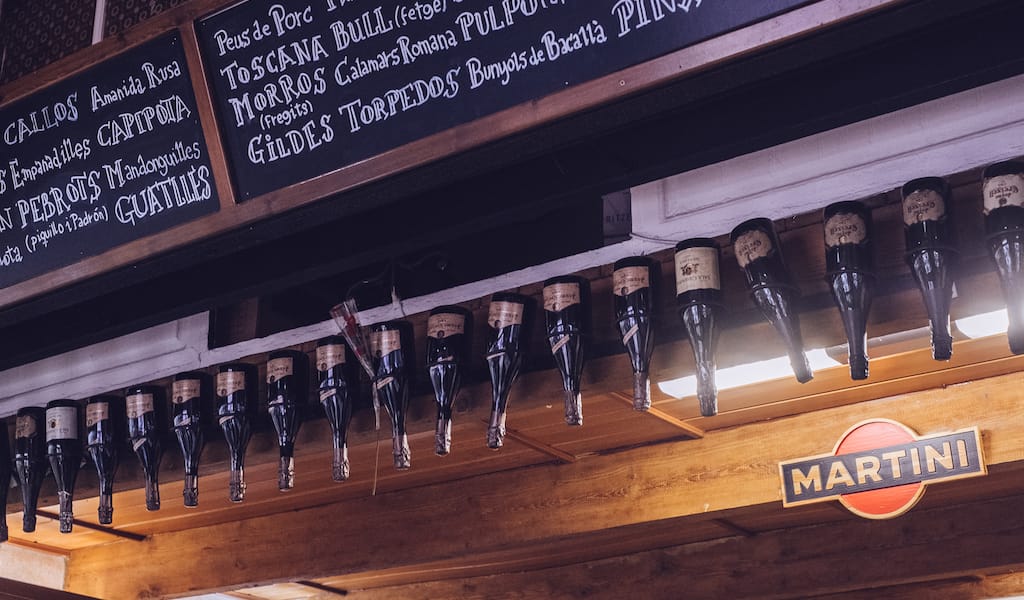Editor’s note: We regret to report that El Jabalí de Ronda has closed.
Barcelona’s Avinguda del Paral·lel was, for the first half of the 20th century, a bustling boulevard of theaters, cabarets, circus shows and risqué nightlife. Nowadays, most of the grand buildings and the glamour of the thoroughfare have been erased by the rapid changes that have taken place in Barcelona, with just a few theaters and old bars from the glory days still open. Thankfully, one of the holdouts is the quirky El Jabalí de Ronda, a combination delicatessen, butcher shop and tapas bar, which still welcomes customers with its signature legs of acorn-fed Iberian ham and its cozy terrace and vases of freshly cut flowers.
El Jabalí de Ronda was opened in 1958, still during the good times of “El Paral·lel” (so named because it runs parallel to the equator), by Paquita Fisas and her husband Emilio García, who took over a local tapas bar that originally belonged to Paquita’s twin brothers. At the time, Emilio’s family had a butcher-delicatessen stall inside the nearby Mercat de Sant Antoni, so the couple decided to bring the little charcutería into their new venue.

As it always has, El Jabalí de Ronda (“The Wild Boar of Ronda”) offers a delightful menu of tapas based on the delicatessen products they carry – aged Castilian and creamy Catalan cheeses, Iberian chorizo, Catalan botifarra sausages – served as hot and cold bocadillos, tapas and raciones (a portion bigger than a tapa but still meant to be shared). We are particularly fond of the ham “bomb,” a hot tapa that consists of small pieces of Iberian ham and some minced onion mixed with chunks of potato into a big ball that is then covered with egg and bread crumbs and deep-fried. The tasty ball is served with a spicy, oil-based sauce of tomato, garlic, cayenne pepper and a little vinegar.
Another of El Jabalí’s famous tapas is their superb Russian salad, made with canned tuna (the good Spanish kind) and a sweet ham mixed with freshly cooked potatoes, carrots, beans and peas, all held together by a delicate mayonnaise. Prepared fresh daily by the chef, this almost artisanal take on Russian salad is served only after being personally tasted by the owners, who seem to take great pride in this sometimes maligned dish. El Jabalí also offers some traditional cooked items, such as Catalan beans with botifarra or cod, and callos (spicy pork tripe), as well as some popular cold salads, like the classic esqueixada, made with tomatoes, onions, peppers and olives that are mixed with pieces of cod (in this case fresh, as opposed to the more traditional bacalao, or dried salt cod).

But the main star of the show here is the Iberian acorn-fed ham, jamón ibérico de bellota. Ever since Jabalí first opened, Emilio, now with his son Jordi, has been making regular trips to two ham hot spots – Salamanca, in the Castile and León region, and Huelva, in Andalusia – to select and mark their favorite cuts. Then, depending on demand, they bring to Barcelona the hams they need and leave the rest in special drying places called secaderos (large, naturally ventilated warehouses in the villages where the ham is sourced), to keep them curing in optimum conditions. These hams, considered by connoisseurs to be among the finest of the Iberian hams, come from pigs who in their last three or four months are fed only acorns. The resulting ham has a deep red color, an intense flavor that is not salty and is even a bit sweet, and a rich layer of fat that leaves a characteristic astringent feeling in the mouth (similar to effect of tannins in wines on the palate) – a peculiar feeling that people tend to either love or hate.
Open from morning to late at night, El Jabalí de Ronda remains a good place to stop and eat something before or after going to a show at one of El Paral·lel’s remaining theaters. It is even visited by some of the actors and singers still performing on the strip, who now find the spot filled with veteran locals and their grandchildren. The glamorous old times may be gone from the area, but don’t tell that to the owners of El Jabalí, who continue to keep the ham stocked and the vases filled with flowers, still as fresh as ever.
Published on April 09, 2013
Related stories
May 15, 2019
IstanbulThink of Ramadan, which just began in many parts of the world, as a kind of monthlong biathlon that consists of an all-day race to beat back the hunger and thirst of fasting, followed by an all-night marathon of eating and drinking in order to fortify the body for the next day’s fast. In recent…
August 31, 2017
Mexico CityAt 2 p.m., the lunch rush begins at El Trapiche, a restaurant along Mexico City’s chaotic Avenida Revolución. Two women arrive from a nearby office and ask for the set lunch menu, comida corrida, that El Trapiche serves for 60 pesos (or around $3.30). “Today we have baleadas,” says Lilian Mendoza Rivera, El Trapiche’s owner…
March 7, 2019
Barcelona | By Ian Walton
BarcelonaMany traditional bodegas in Barcelona are lined with bulk wine barrels, chalk marked with their content’s region of origin. But they also sell bottles of wine and other libations – vermut, draft beer and more. We get to sample these drinks, and the traditional Spanish foods that accompany them, at some of the city’s most…



















































































